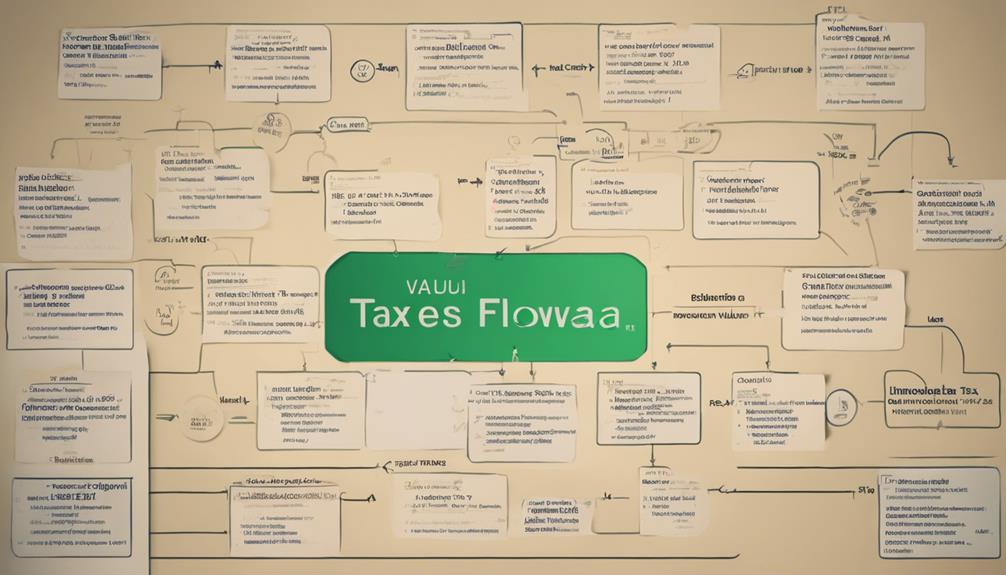Tax in Saudi Arabia is a multifaceted subject that impacts both residents and non-residents in distinctive ways. With the absence of personal income tax for Saudi nationals and a flat income tax rate for resident non-Saudis and non-GCC individuals, understanding the nuances of taxation in the kingdom is crucial.
Moreover, the concept of Zakat adds another layer of complexity to the tax landscape. As the General Authority of Zakat & Tax (GAZT) oversees tax matters with a focus on compliance, exploring the intricacies of tax regulations in Saudi Arabia becomes imperative for individuals and businesses alike.
Overview of Tax System

In Saudi Arabia, the tax system showcases a unique blend of policies. This includes a flat income tax rate for resident non-Saudi and non-GCC individuals, withholding tax for non-residents, and the application of Zakat on net worth for Saudi or GCC nationals.
Resident non-Saudi and non-GCC individuals are subject to a 20% flat income tax rate, despite the absence of personal income tax in the country. Non-residents earning income from Saudi Arabia are liable to withholding tax, which varies based on the types of payments received.
Saudi or GCC nationals are obligated to pay Zakat, a religious levy calculated on their net worth. Capital gains in Saudi Arabia are taxed at a flat rate of 20%, with certain exemptions provided for specific shares traded on stock exchanges.
Moreover, Saudi Arabia has tax treaties with 51 countries that allow for income exemptions related to the international activities of aircraft and ships within the country.
Tax Regulations and Rates
Within the framework of tax regulations and rates in Saudi Arabia, the application of a flat income tax rate of 20% on non-Saudi and non-GCC resident individuals stands as a prominent feature. This rate also extends to the taxation of capital gains in the country, with a similar 20% rate applied, albeit with exemptions for certain shares traded on stock exchanges.
It is important to note that Saudi nationals and GCC citizens are not subjected to income tax but rather to Zakat, a religious levy based on net worth. Non-Saudi investors operating in the country, however, fall under the income tax regime.
Moreover, withholding tax (WHT) is enforced on non-residents receiving income from Saudi Arabia, with rates varying depending on the type of payment. Saudi Arabia has also entered into tax treaties with 51 countries, providing guidelines for income exemption concerning international operations involving aircraft and ships in specific cases. These regulations and rates underline the complexity of the tax system in Saudi Arabia, particularly concerning the differentiation between residents and non-residents.
Recent Updates and Changes

Amidst ongoing developments in tax regulations, noteworthy adjustments have been introduced to withholding tax rates on various types of payments in Saudi Arabia. These recent updates aim to enhance the efficiency and transparency of the tax system in the country.
Furthermore, amendments to tax treaties with other nations have been made to facilitate international operations involving aircraft and ships, promoting smoother transactions and fostering better international relations.
The General Authority of Zakat & Tax (GAZT) has issued comprehensive guidelines on tax compliance and reporting requirements, ensuring that businesses and individuals meet their obligations accurately and in a timely manner.
Additionally, changes in tax filing procedures have been implemented to simplify the process for both residents and non-residents, making it more accessible and user-friendly.
Taxation for Individuals
Individuals residing in Saudi Arabia are subject to specific taxation regulations overseen by the General Authority of Zakat & Tax (GAZT). Non-Saudi and non-GCC individuals in the country are subject to a flat income tax rate of 20% as residents. Withholding tax rates vary based on the types of payments received by non-residents in Saudi Arabia.
To be considered taxpayers in Saudi Arabia, residents must meet specific conditions set by the GAZT. Generally, employment income and allowances of expatriates are not taxed in Saudi Arabia. The taxation system for individuals in the country is designed to ensure compliance with the tax laws and regulations established by the GAZT.
Understanding these regulations is essential for individuals living and working in Saudi Arabia to fulfill their tax obligations and avoid any potential penalties for non-compliance.
Taxation for Businesses

Businesses operating in Saudi Arabia are subject to specific taxation regulations overseen by the General Authority of Zakat & Tax (GAZT). Non-Saudi investors in businesses within the country are liable to pay income tax, while Saudi and GCC citizen investors are mandated to pay Zakat on their business profits.
Taxable income related to non-Saudi interests in businesses is also subject to taxation. The assessment of Zakat considers the Saudi ownership share in a company.
Moreover, income tax is applicable to resident capital companies, non-resident individuals, and specific business activities conducted in Saudi Arabia. It is crucial for businesses in the Kingdom to adhere to these regulations to ensure compliance with the tax laws enforced by the GAZT.
Understanding and fulfilling tax obligations is essential for businesses to operate smoothly and avoid any penalties or legal issues related to taxation in Saudi Arabia.
Frequently Asked Questions
Are Taxes High in Saudi Arabia?
Tax rates in Saudi Arabia are moderate, aiming to attract foreign investment and promote economic growth. The tax environment is generally considered favorable for individuals, with no personal income tax. However, non-Saudi and non-GCC residents are subject to a flat income tax rate of 20%.
Withholding tax is also imposed on non-residents receiving income from Saudi Arabia. The General Authority of Zakat & Tax (GAZT) oversees tax matters in the country, ensuring compliance and effective administration.
How Much Tax Is Deducted From Salary in Saudi Arabia?
When looking at deductions from salaries, it is crucial to consider the applicable tax rates and regulations in the specific jurisdiction. Various factors such as residency status, income levels, and local tax laws determine the amount of tax withheld from an individual’s salary.
Understanding these elements is key to accurately assessing the tax deductions individuals may experience from their earnings.
Is Money Tax Free in Saudi Arabia?
Money is not tax-free in Saudi Arabia for non-Saudi and non-GCC individuals. They are subject to a 20% flat income tax rate on their earnings. However, personal income for Saudi nationals is not taxed.
Expatriates working in the country also do not pay income tax on their earnings. It is important for individuals to understand the tax regulations applicable to their specific situation to ensure compliance with Saudi Arabian tax laws.
How Much Is VAT in Ksa?
The Value Added Tax (VAT) rate in KSA is 15%. VAT applies to most goods and services, with some exceptions and zero-rated supplies. Certain sectors like healthcare, education, and financial services are exempt.
Businesses with yearly revenues over SAR 375,000 must register for VAT. VAT registration enables businesses to reclaim input VAT on purchases and charge output VAT on sales, fostering compliance with tax regulations and contributing to the country’s revenue generation.
Conclusion
In conclusion, the taxation system tax in Saudi Arabia operates differently for residents and non-residents, with varying tax rates and regulations in place.
The General Authority of Zakat & Tax (GAZT) oversees tax matters in the country, emphasizing timely compliance with tax laws to avoid penalties.
It is essential for individuals and businesses in Saudi Arabia to understand and adhere to the tax regulations to ensure proper tax compliance.






